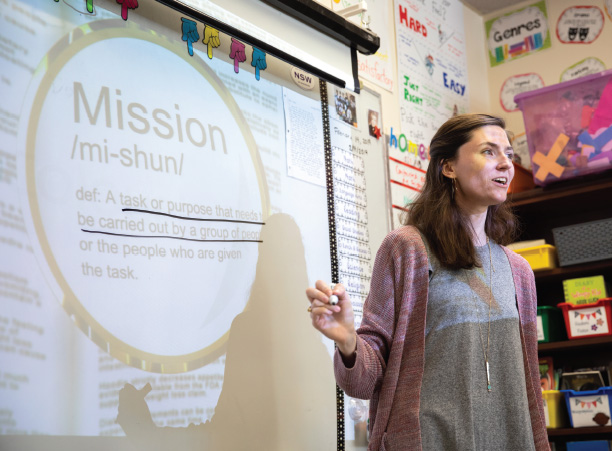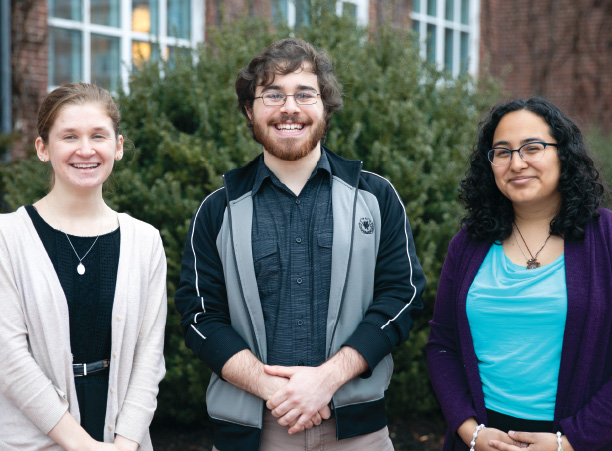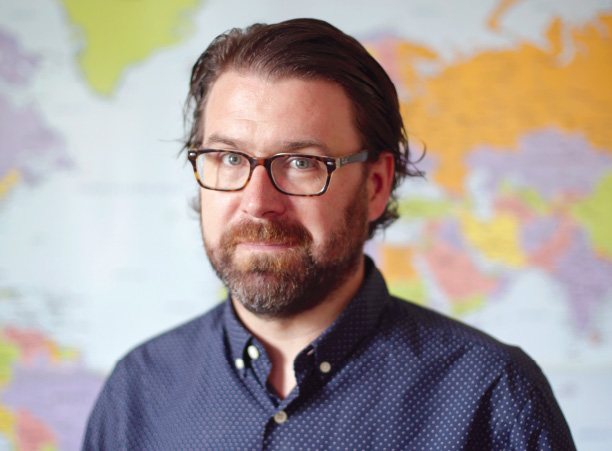 Rev. Thomas McMurray, S.J., wears many hats at Nativity School of Worcester — director of admissions, director of Jesuit mission and identity, and chaplain. When he needed help developing a religious education curriculum for the school, he knew where to look — just a few miles away.
Rev. Thomas McMurray, S.J., wears many hats at Nativity School of Worcester — director of admissions, director of Jesuit mission and identity, and chaplain. When he needed help developing a religious education curriculum for the school, he knew where to look — just a few miles away.
Holy Cross, it turned out, had the perfect program to assist the private middle school: The Ignite Fund. A now two-year-old initiative of the College's J.D. Power Center for Liberal Arts in the World, the program funds student-driven projects, providing the opportunity and resources to put what they've learned in the classroom to work. Rather than waiting until after graduation to make an impact on the world beyond The Hill, The Ignite Fund gives students the foundation they need to put their scholarship and skills to the test immediately.
Rev. John Gavin, S.J., associate professor of religious studies, looked to two students: history major Stefanie Raymond '18 and religious studies major Roxana Ruiz '20, both women offering backgrounds in Catholic studies and education.
"They understood what a curriculum plan would be," Fr. Gavin says. "It seemed like a perfect fit."
The women thought so, too, and embraced the project.
"What most appealed to me was the ability to combine two things that I really loved: religion and education," Raymond says. "Because my own religious education had played a big part in my life — I attended Catholic schools from kindergarten to college — I was excited to have an opportunity to apply what I had been taught in a new way."
"I believe in the goodness that a Jesuit, Catholic education can give to students and even teachers that teach it," Ruiz adds. "It can provide a more holistic development of the person, no matter the background they come from."
The 16-year-old Nativity School of Worcester (NSW) provides a tuition-free Jesuit education for underserved fifth-through eighth-grade boys of all faiths. Many of the school's faculty are Nativity Fellows, recent college graduates hired as full-time teachers for a two-year tenure. Fellows are not required to have a background in education, which left Fr. McMurray with the challenge of creating a structured, integrated curriculum that could build year to year. He and Jesuit novice Kieran Halloran, nS.J., developed a framework, which included teaching the fundamentals of Catholicism, providing an interfaith component and addressing social justice issues. Fr. McMurray then approached Holy Cross and the Ignite Fund for help making it a reality.
"We thought this would be a perfect match," says Patrick T. Maloney '02, the school's president, "and we were lucky [Holy Cross] thought the same way."
Throughout the 2017-2018 academic year, Raymond and Ruiz wrote a curriculum for the fifth grade, creating a turn-key program that provides the school's staff with the course and tools needed to teach religion, including lesson plans and lists of texts, readings and other resources.
 Nativity teaching fellow Lily Cook '17. Photo by Avanell Brock
Nativity teaching fellow Lily Cook '17. Photo by Avanell BrockAdds Fr. McMurray: "One of the great features of the religious education curriculum is how spirituality informs all four years of the program, providing a spiritual formation for both students and teachers that integrates the service and retreat program with the academic. And, most importantly for us as a Jesuit school, how Ignatian spirituality offers a world view and serves as a lens through which students can explore and engage the important human issues confronting the world today."
Raymond, who worked on this project during her senior year, can well identify with the life of a new teacher, as she has since graduated and is now a first-year teacher at Grace Academy, a Hartford, Connecticut, school for girls in grades five through eight. "It's been a good, but hard, transition," she notes. Thanks to her Ignite Fund experience, she has greater appreciation of — and experience in — curriculum writing.
The project has continued into this academic year, with Michael Raheb '20 joining Ruiz, as they write the curriculum for grades six, seven and eight. The work is time-consuming, Ruiz says, but has produced myriad benefits.
"I feel it's made me grow a lot as a person, not just as a student," Ruiz says. Working on the project has given her confidence about becoming a teacher and she has shifted her focus from math to religious studies. After graduating, she hopes to teach in an underserved Catholic community, then possibly earn a master's in theology or education.
The Intersection of Innovation and Risk
 Curriculum authors Stefanie Raymond '18, Michael Raheb '20 and Roxana Ruiz '20. Photo by Avanell Brock
Curriculum authors Stefanie Raymond '18, Michael Raheb '20 and Roxana Ruiz '20. Photo by Avanell Brock"Students come away with confidence, thinking, 'I know my degree has prepared me for the real world because I have this experience working in the real world,'" Klinghard says.
The seeds of the Ignite Fund were planted a few years ago — literally — when students interested in sustainable food sought to establish community gardens on campus. As Klinghard tells it, there weren't many resources on campus available to make a resource-intensive project like that happen: It wasn't research. It wasn't an internship. College Provost and Dean Margaret Freije funded the project on an ad-hoc basis. The students did their research, visited other colleges that hosted community gardens and eventually plots were planted near O'Neil and Ciampi halls.
The success of that effort prompted Freije and others to wonder what else students might accomplish if given the opportunity to pursue their ideas. Ultimately, the Ignite Fund was born. It has since funded a range of projects, including an after-school program for children; a student musician's recording to help his music career; a study of how the colors and styles of plates affect food choices and waste; and even the development of a prototype sports net that measures the speed of balls and pucks.
Students who apply for funding work with J.D. Power Center staff to develop a proposal, identify possible community support, create a budget and run a Launchpad session, a meeting open to the campus on the particular issue.
"The idea is to get people together who share common intellectual interests and get them talking about how they can do something about it in the world," Klinghard says.
Even if no project emerges, there is value in getting students talking about issues and what they can do about them, he says.
 Daniel Klinghard, director of the J.D. Power Center for Liberal Arts in the World. Photo by Tom Rettig
Daniel Klinghard, director of the J.D. Power Center for Liberal Arts in the World. Photo by Tom RettigThe Nativity School of Worcester religious education curriculum and other projects funded by the Ignite Fund are grounded in the Jesuit tradition of experiential learning and impact, Klinghard notes: looking at the world, putting hands and mind to work, reflecting and moving on to greater action. It's a desire Ruiz hopes will have an impact far beyond its Worcester roots.
"We hope to develop an environment where Jesuit identity is not only recognized in the classroom, but also throughout their schooling experience," she says. "We wish for the students to take on this identity when they move on from Nativity School of Worcester, where they continue reflecting, discerning and forming a community with others."
Written by Dave Greenslit for the Spring 2019 issue of Holy Cross Magazine.
About Holy Cross Magazine Holy Cross Magazine (HCM) is the quarterly alumni publication of the College of the Holy Cross. The award-winning publication is mailed to alumni and friends of the College and includes intriguing profiles, make-you-think features, alumni news, exclusive photos and more. Visit magazine.holycross.edu/about to contact HCM, submit alumni class notes, milestones, or letters to the editor.

